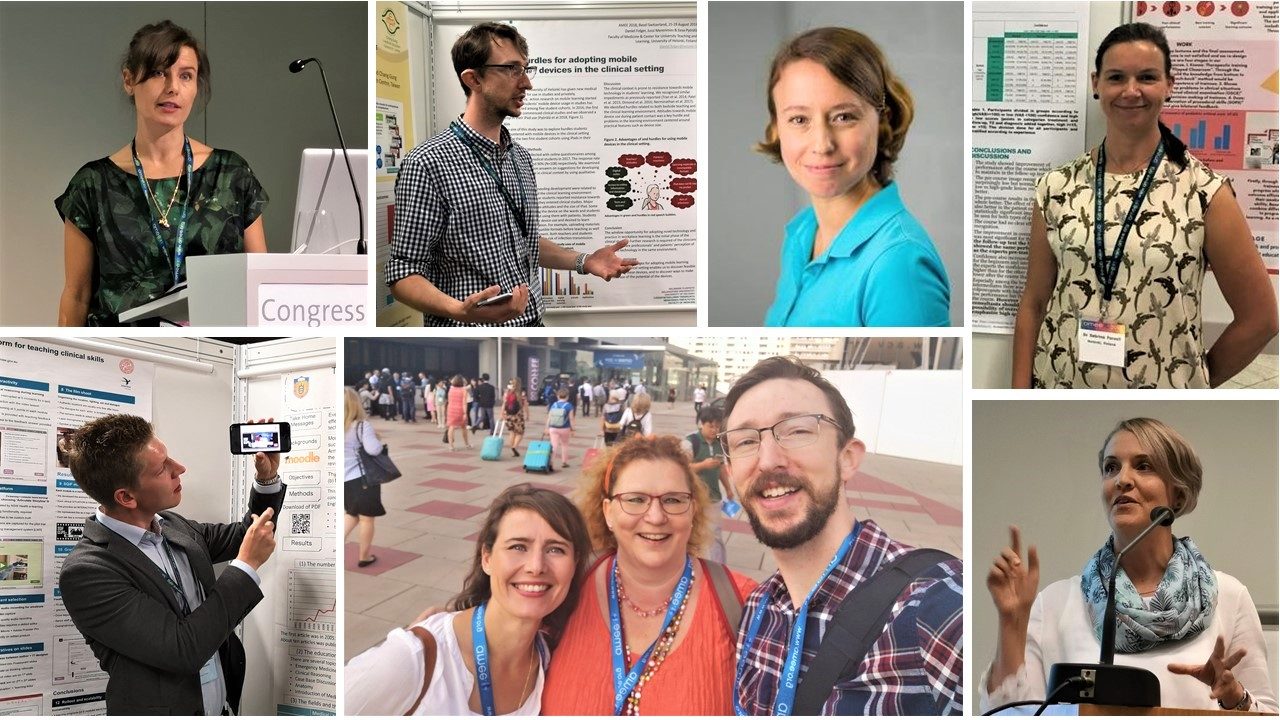Mobile learning, virtual learning environment and online assessment
Daniel, Tomi, Sanna and Eeva are conducting research on digital learning environments and technology-enhanced learning. Our research is based on both quantitative survey data and qualitative data. We explore the development of student learning along the usage of mobile devices in study contexts, e.g. clinical studies and working life contexts, and the new, innovative ways the students use new technology in their studies, e.g. note taking. We explore the virtual learning environments, such as virtual patients, in learning of clinical reasoning.
As part of the digital leap of the University of Helsinki, the Faculty of Medicine carried out an electronic exam pilot in 2017-2019. In the pilot, Sanna, collected surveys of students ’and teachers’ experiences of electronic assessments and the platforms used in the pilot. Since then, the faculty has sought to increase the implementation of online assessment in all areas taught. The results of the pilot were valuable when, as a result of the pandemic, teaching and assessment were carried out remotely.
Distance teaching, learning and assessment
The impact of Covid-19 on teaching, learning and assessment is an important theme. In 2020, we collected surveys on students’ experiences on distance learning and assessment. We also study teachers’ digital teaching competences in a cross-disciplinary study between the faculties and teachers’ perceptions on digital assessment tools in a national MEdigi assessment study. It is vitally important to have research-based evidence of distance learning and learning practices so that we can develop effective distance learning practices after this pandemic and choose which distance learning and assessment practices we could further develop and integrate as a part of our studies in the so called new normal.
Communication skills studies
Good communication skills with patients is one of physicians’ key professional competences. Communication skills studies have formed of the basic medical degree for about 25 years. Communication skills are practiced with fellow students, simulated patients and real patients. Asta examines students’ communication skills learning especially in simulations with actors as patients, the students’ feelings when breaking bad news and feedback discussions as part of simulation sessions.
Active learning methods in clinical studies
All degree programs in the Faculty of Medicine apply the principles of constructive alignment and implement active learning methods, the aim of which is to support the student’s own learning processes. Active learning methods support students’ own learning processes, activating their previous knowledge and skills, and integrating it into new learned material in a new meaningful way.
The Meilahti campus applies problem-based learning, team-based learning and Flipped Classroom approaches. In addition to real patient situations, clinical skills are practiced in skill workshops. The studies use digital and virtual materials and applications, which are studied by Daniel and Tomi. Sabrina explores the use of active learning methods in the teaching of gynecology and obstetrics.
Pain curriculum in the physiotherapy studies
The aim of Jolanda’s study is to develop physiotherapy students’ pain education in Finland. Jolanda’s study uses two international instruments. “Health Care Providers’ Pain and Impairment Relationship Scale” (HC-PAIRS) assesses the respondents knowledge, beliefs and attitudes towards back pain, and the “Neurophysiology of Pain Questionnaire” (NPQ) assesses how the respondents conceptualize the biological mechanisms underpinning pain. We translated these questionnaires and test their validity in the Finnish context in surveys among physiotherapy students and professional physiotherapists.
Scholarship of Teaching and Learning
The Scholarship of Teaching and Learning (SoTL) is a key theoretical framework for fostering research-based development of teaching and learning in higher education. For decades, teachers on the Meilahti campus have been active in developing teaching and presented their projects at AMEE and ADEE conferences. In 2013, the Teachers’ Academy, a reward system and an interdisciplinary community of outstanding teachers was established at the University of Helsinki. Eeva was one of the promoters of the Teachers’ Academy and has been active in supporting teachers, students and PhD students in their development projects and presenting them at national and international conferences. Eeva has published articles with members of the Teachers ’Academy and also publishes studies on the Teachers’ Academy.
